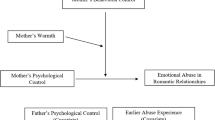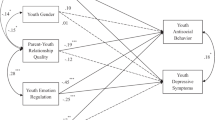Abstract
The goal of the present study was to explore the relationship between emotional reactivity toward parents and interpersonal competence. It was asserted that the types of present day interactions that are experienced with parents may be related to the level of comfort and competence experienced in interpersonal relationships outside the family. Interactions with parents were assessed with the Behavioral and Emotional Reactivity Index, a newly developed scale [S. E. Bartle and R. M. Sabatelli, (1995) “The Behavioral and Emotional Reactivity Index: Preliminary Evidence for Construct Validity from Three Studies,” Family Relations, Vol. 44, pp. 267–277]. In addition, much of the past research investigating these issues has failed to make a distinction between intimacy in same-sex vs. intimacy in opposite-sex relationships. In an effort to be sensitive to the possibility that family dynamics and gender may be differentially related to the development of the capacity for intimacy within these two types of relationships, interpersonal competence in both same-sex friend and dating partner relationships were explored. The results of a doubly repeated multivariate analysis of variance suggested that emotional reactivity toward parents was related to interpersonal competence in both same-sex friend and dating partner relationships regardless of gender. The results also demonstrated a gender by gender of partner interaction.
Similar content being viewed by others
REFERENCES
Anderson, S. A., and Sabatelli, R. M. (1990). Differentiating differentiation and individuation: Conceptual and operational challenges. Am. J. Family Ther. 18: 32–50.
Bartle, S. E. (1996). Family of origin and interpersonal contributions to the interdependence of dating partners' trust. Person. Relat. 3: 197–209.
Bartle, S. E. and Sabatelli, R. M. (1995). The Behavioral and Emotional Reactivity Index: Preliminary evidence for construct validity from three studies. Fam. Relat. 44: 267–277.
Bernt, T. J. (1982). The features and effects of friendship in early adolescence. Child Develop. 53: 1447–1460.
Bowen, M. (1976) Theory and practice in psychotherapy. In Guerin, P. J. (Ed.), Family Therapy: Theory and Practice. Gardner Press, New York.
Bowen, M. (1978). Family Therapy in Clinical Practice. Jason Aaronson, New York.
Buhrmester, D., Furman, W., Wittenberg, M. T., and Reis, H. T. (1988). Five domains of interpersonal competence in peer relationships. J. Personal. Social Psychol. 55: 991–1008.
Cooper, C. R. and Grotevant, H. D. (1987). Gender issues in the interface of family experience and adolescents' friendship and dating identity. J. Youth Adolesc. 16: 247–264.
Craig-Bray, L., Adams, G. R. and Dobson, W. R. (1988). Identity formation and social relations during late adolescence. J. Youth Adolesc. 17: 173–187.
Erikson, E. (1968). Identity: Youth and Crisis. Norton, New York.
Friedman, E. H. (1991). Bowen theory and therapy. In Gurman, A. S., and Kniskern, D. P. (Eds.). Handbook of Family Therapy: Volume II. Brunner/Mazel, New York.
Fischer, J. L. (1981). Transitions in relationship style from adolescence to young adulthood. J. Youth Adolesc. 10: 11–23.
Hoffman, J. A. (1984). Psychological separation of late adolescents from their parents. J. Counsel. Psychol. 31: 170–178.
Karpel, M. (1976). Individuation: From fusion to dialogue. Family Proc. 15: 65–62.
Kerr, M. E. (1984). Theoretical base for differentiation of self in one's family of origin. Clin. Super. 2: 3–36.
Lapsley, D. K., Rice, K. G., and FitzGerald, D. P. (1990). Adolescent adjustment, identity and adjustment to college: Implications for the continuity of adaptation hypothesis. J. Counsel. Develop. 68: 561–565.
Papero, D. V. (1988). Training in Bowen Therapy. In Liddle, H. A., Breunlin, D. C., and Schwartz, R. C. (Eds.) Handbook of Family Therapy Training and Supervision. Guilford, New York.
Paul, E. L., and White, K. M. (1990). The development of intimate relationships in late adolescence. Adolescence 25: 375–400.
Reeves, P. C., and Johnson, M. E. (1992). Relationship between family-of-origin functioning and self-perceived correlates of eating disorders among female college students. J. College Student Develop. 33: 44–49.
Sharabany, R., Gershoni, R., and Hofman, J. E. (1981). Girlfriend, boyfriend: Age and sex differences in intimate friendship. Develop. Psychol. 17: 800–808.
Wheeler, L., Reis, H., and Nezlek, J. (1983). Loneliness, social interaction, and sex roles. J. Personal. Social Psychol. 45: 943–953.
Williamson, D. S. (1982). Personal authority in family experience via termination of the intergenerational hierarchical boundary: Part III—Personal authority defined, and the power of play in the change process. J. Marital Family Ther. 8: 309–323.
Youniss, J. (1983). Social construction of adolescence by adolescents and their parents. In Grotevant, H. D., and Cooper, C. R. (Eds). Adolescent Development in the Family, New Directions for Child Development, No. 22. Jossey-Bass, San Francisco.
Youniss, J., and Smollar, J. (1985). Adolescent Relations with Mothers, Fathers, and Friends. The University of Chicago Press, Chicago, IL.
Author information
Authors and Affiliations
Rights and permissions
About this article
Cite this article
Bartle-Haring, S., Sabatelli, R.M. Emotional Reactivity Toward Parents and Interpersonal Competence: Differences Across Gender and Type of Relationship. Journal of Youth and Adolescence 26, 399–413 (1997). https://doi.org/10.1023/A:1024577204356
Issue Date:
DOI: https://doi.org/10.1023/A:1024577204356




